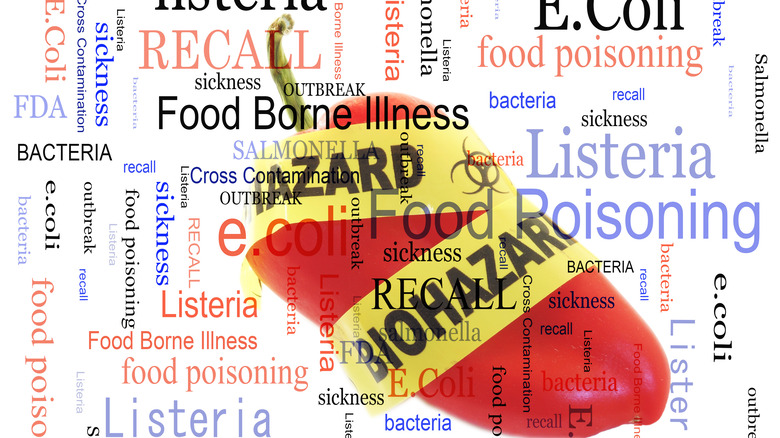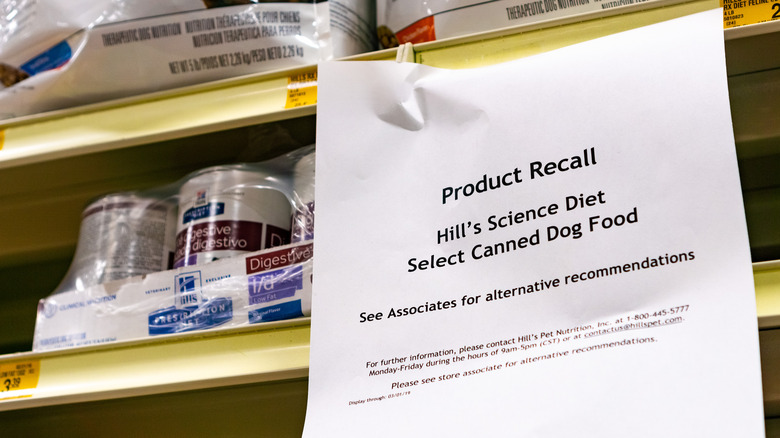New Study Reveals A Scary Truth About Food Recalls
Food recalls are very important pieces of news. Sometimes, foods are recalled for the scariest reasons and the items must be removed from store shelves due to health and safety concerns. They usually happen for three major reasons: The item has been contaminated with a foreign substance, such as metal or glass; a harmful bacteria or parasite, such as salmonella, has been discovered in the item; or the product contains an undisclosed food allergen, according to foodsafety.gov. If a consumer has purchased these contaminated items, it is important that they learn about it immediately so that they do not consume the product, which could potentially make them sick. Instead, anyone who has purchased a recalled item is encouraged to return it to the store for a refund, or simply toss it in the garbage.
However, a recent study shows that some people may not be tossing or returning their recalled items. In fact, many consumers may not even be aware that the product they purchased was recalled. According to a new study conducted by the U.S. Public Research Interest Group, many food recall notices that are issued by the FDA are not reaching their intended audience of consumers.
News of food recalls doesn't always reach consumers
It may feel like there has been an increase in food recalls, and when one happens the FDA only requires two courses of action. The FDA itself makes an official post on their website, and the company initiating the recall must issue a press release, via U.S. Public Research Interest Group. However, this method of communication leaves many consumers out of the loop. "Right now, it's a hodgepodge. Some of the blame is on the shoulders of the groceries, some of it is on the FDA, and frankly, some of it's on the part of consumers, who need to do more to make sure that they're informed," explained Teresa Murray, an Arizona-based U.S. Public Research Interest Group consumer watchdog, via Public News Service.
Part of the problem, according to Dr. Ben Chapman, a professor and food safety specialist in the Department of Agricultural and Human Sciences at North Carolina State University, is that "we have an inconsistent, fragmented system. No one really owns recalls," via U.S. Public Research Interest Group. As a result, it can take a long time for news of the recall to actually reach consumers, if it reaches them at all. In the meantime, consumers could consume the product and become sick. According to the CDC, 1 in 6 Americans get sick and 3,000 die from foodborne illnesses each year, a number which could be much smaller if the news of recalled items reached more people faster.
Retailers could do more to spread awareness of food recalls
The study further showed that only 50% of retailers surveyed made any effort to "notify affected customers by phone, text or email within one business day" after an item has been recalled by the FDA. Some stores also made other efforts, including posting the news to the store's websites or social media accounts, or posting signage in-store in the affected item's department or by the check-out register, according to U.S. Public Research Interest Group. While under the current FDA guidelines, retailers have no obligation to alert consumers, doing so could potentially greatly help in reducing the number of people who are sickened by contaminated products each year.
The U.S. Public Research Interest Group recommends several steps that could be taken to help spread the news of food recalls, beginning with the FDA itself. While not all food recalls are potentially lethal, the most serious ones could prompt more direct messaging to consumers, either through calls, texts, or emails. Retailers could also be more consistent in their notifications, and technology, such as scanning QR codes to determine if an item has been recalled, could be utilized in a much more significant way. And of course, while you may be seeing fewer food recalls in the news, it is always important for consumers to stay informed and educated about their health and food safety, especially vulnerable populations such as those that are sick, elderly, or pregnant.


